AdGuard VPN Review: Quick Expert Summary
AdGuard VPN is secure, fast, good for streaming, and has user-friendly apps. In addition to having industry-standard VPN security features, like a kill switch, 256-bit AES encryption, and a strict no-logs policy, it also comes with extra features, like split-tunneling and full leak protection. Plus, it works with all of the major streaming services, including Netflix and Amazon Prime.
However, the VPN has some drawbacks — its no-logs policy hasn’t been independently audited, and it lacks advanced security features, such as RAM-only servers. It also has a small server network of 1,000+ servers in 60 countries and slower speeds on distant servers. Moreover, it’s missing 24/7 live chat and the email support is quite slow. There are better VPNs on the market, like ExpressVPN, which has all the advanced security features, a massive server network, 24/7 live chat, and more.
AdGuard VPN has 1-month, 1-year, and 2-year plans. There’s a 30-day money-back guarantee on the 1-year and 2-year plans.
| 🏅 Overall Rank | #42 out of 82 VPNs |
| 🌍 Number of Servers | 1,000+ |
| 📱 Number of Devices | 10 |
| 💸 Starting Price | $2.99 / month |
| 🎁 Free Plan | Yes |
| 💰 Money-Back Guarantee | 30 days |
AdGuard VPN Full Review — Good Features & Easy to Use, but It’s Lacking in Some Areas
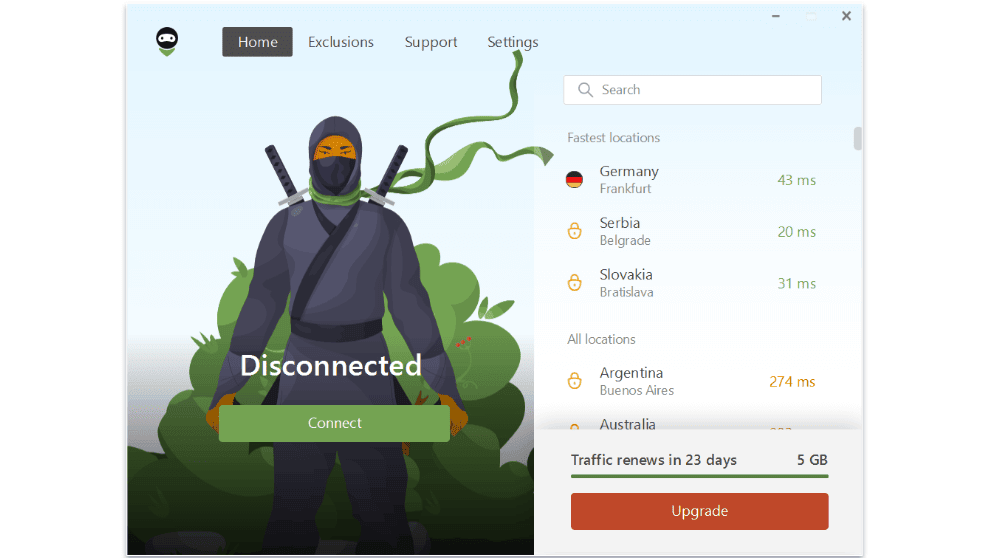
I spent a couple of weeks researching and testing AdGuard VPN to see how it compares to the best VPNs on the market. The VPN comes with strong security features, user-friendly apps, and some extra features. Plus, it has great streaming support and is headquartered in Cyprus, which is a privacy-friendly country.
However, AdGuard VPN lacks some important features — it doesn’t use RAM-only servers, and its no-logs policy hasn’t been independently audited. Moreover, it has a small server network and lacks 24/7 live chat.
AdGuard VPN Plans & Pricing — Several Reasonably Priced Plans
AdGuard VPN offers several long-term plans, with prices starting at $2.99 / month. The VPN’s plans are reasonably priced, and the 2-year plan provides the most value. However, top VPNs like ExpressVPN and Private Internet Access offer better value because they have larger server networks, more extra features, and faster speeds.
This VPN also offers a free plan, but I’m not a fan of it — the plan limits you to a monthly data cap of 3 GB and 10 server locations. Moreover, it allows you to use the VPN on 2 devices simultaneously. If you’re only in the market for a free plan, check out Proton VPN, which allows unlimited bandwidth and has faster speeds.
The provider has multiple payment options — credit/debit cards, PayPal, and cryptocurrencies. Plus, the VPN allows up to 10 simultaneous connections and only the 1-year and 2-year plans have a 30-day money-back guarantee.
AdGuard VPN Features — Covers All the Basics, but It Lacks Some Advanced Extra Tools
AdGuard VPN has industry-standard VPN security features, including:
- 256-bit AES encryption — AdGuard VPN secures your data with the same encryption used by banks and governments.
- No-logs policy — AdGuard VPN doesn’t store your personal data, browsing activity, or other sensitive information.
- Kill switch — If your VPN connection drops, a kill switch will disconnect your internet connection to prevent any leaks. The kill switch feature is available on all the apps, except for the iOS app.
AdGuard VPN has its own proprietary protocol called AdGuard VPN protocol. It uses the HTTP/2 transport protocol, which masks your VPN traffic as regular traffic. That being said, I’d like to see it either undergo an independent audit or make it an open-source protocol, which would help me trust it more. For example, ExpressVPN’s proprietary Lightway protocol has passed an audit, and other popular protocols like OpenVPN and WireGuard are open-source.
AdGuard VPN also offers the QUIC communication protocol, which is the latest version of HTTP. It gives a better connection quality when connected to public Wi-Fi or using mobile data in the subway or elevator. Moreover, the iOS app in Integrated mode uses the IPSec protocol, which is secure but a bit slower.
However, the VPN lacks advanced security features like RAM-only servers, which wipe all data with each reboot. Many top competitors, like ExpressVPN, Private Internet Access, and CyberGhost VPN, include this key feature.
The VPN has full leak protection — DNS, WebRTC, and IPv6. In my tests, I experienced no leaks when I ran leak tests while connected to servers in 20+ countries. It also has perfect forward secrecy, which is a security feature that changes the encryption key for each session, minimizing the amount of data hackers could access.
AdGuard VPN also offers extra features, including:
- Split-tunneling — This feature allows you to choose which apps and/or websites go through the VPN tunnel while directing the rest through your local network connection. AdGuard VPN’s General mode lets you list the websites you want to exclude from the VPN tunnel. So, the VPN will work everywhere except on these websites. In Selective mode, the VPN works only on the websites listed in the inclusion list. In my tests, I routed only my Chrome browser app through the VPN, and I got faster speeds for streaming.
- AdGuard DNS — The AdGuard DNS is a server that blocks ads, ad trackers, and connections to phishing websites. When you type a URL or open a link, AdGuard DNS analyzes the corresponding IP address and blocks access if it belongs to a malicious site. AdGuard VPN offers several DNS servers, like Google DNS, and Cloudflare DNS. During my tests, it blocked only some ads, but it successfully prevented me from accessing shady sites. That said, I prefer Private Internet Access’s PIA MACE more as it can reliably block ads, ad trackers, and shady sites.
AdGuard VPN Privacy & Security — Strict No-Logs Policy & Privacy-Friendly Location
AdGuard VPN has a strict no-logs policy — it doesn’t store your browsing history, IP address, or what files you download. The VPN collects your email address and password. It also collects cookies for personalizing the content of the VPN’s website and billing and payment information.
I would like to see AdGuard VPN’s no-logs policy go through an independent audit. Top VPNs like ExpressVPN and Private Internet Access have had their no-logs policies independently audited and confirmed, making them more transparent.
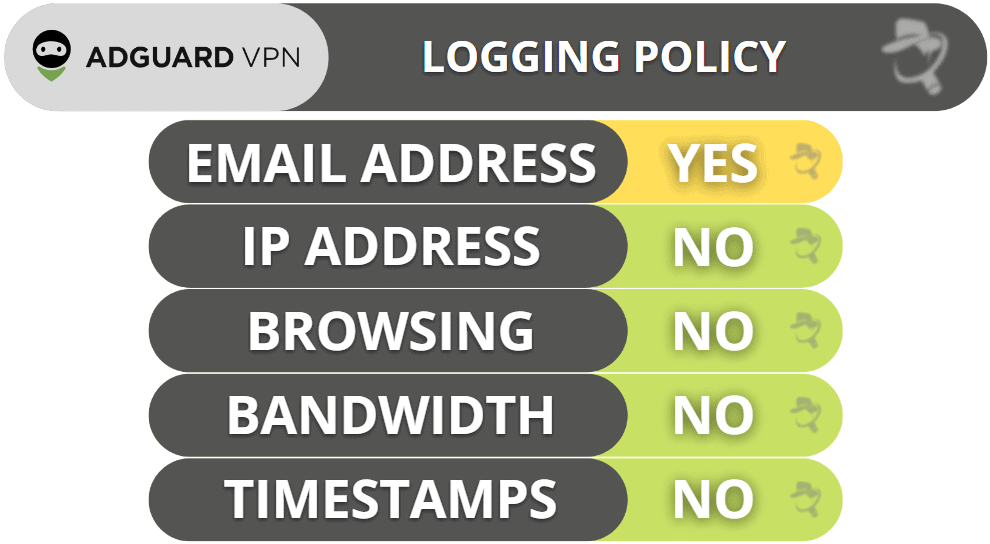
AdGuard VPN is headquartered in Cyprus, which is a privacy-friendly country. This is good news as Cyprus isn’t a part of the 5/9/14 Eyes Alliances, which is a group of countries that share surveillance data.
Overall, AdGuard VPN has a strict no-logs policy, but it hasn’t been independently audited. Plus, it’s based in a privacy-friendly country.
AdGuard VPN Speed & Performance — Fast on Nearby Servers, Slowdowns on Distant Ones
I ran speed tests on my Windows PC on servers in all 60 locations where AdGuard VPN has a server. I experienced the fastest speeds when connected to a nearby server (in North Macedonia). There was a slight slowdown when connected to distant servers in the US.
First, I ran a speed test without a VPN to determine my baseline internet speeds. Then, I connected to the nearest server to my location.
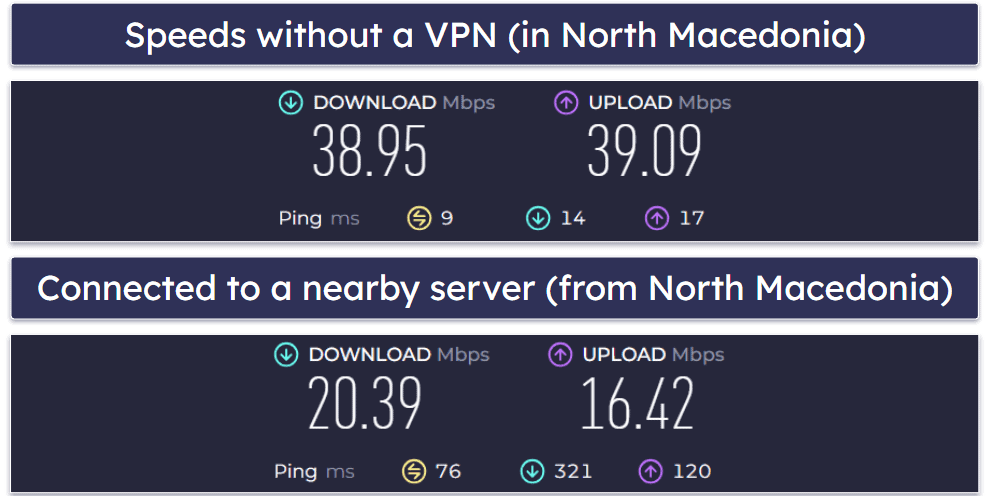
Finally, I connected to a distant server in the US. Here are my speeds:

When I connected to a nearby VPN server, my speeds dropped by about 47%. That said, sites loaded instantly, but there was minor buffering when I tried to load HD videos.
When I connected to a distant server in the US, my speeds dropped by 51%. Sites took 3–4 seconds to load, and there were 10-second interruptions when I was trying to watch HD videos.
Overall, I experienced fast speeds on nearby servers, and there were slowdowns on distant servers. There are much faster VPNs out there.
AdGuard VPN Servers & IP Addresses — Small but Evenly Distributed Server Network
AdGuard VPN has 1,000+ servers in 60 countries. The servers are located in the US, Europe, Asia, the Middle East, Africa, and Oceania, so most users can find a local server or at least one in a neighboring country for the fastest speeds. However, AdGuard VPN fails to match the server networks of many competitors, including ExpressVPN, CyberGhost VPN, and Surfshark, which all have servers in 100+ countries.
The VPN has virtual servers in some countries, like Russia and India, due to legal restrictions. Virtual servers provide you with an IP address from the country you connect to but the physical servers are in a different country.
I like that the VPN displays the server’s latency, which shows how long it takes data to travel from your device to the server. This helps you pick the fastest one, and not all VPNs share this information.
This provider allows obfuscation on all servers using the AdGuard VPN protocol. However, the obfuscation feature isn’t guaranteed to work in restrictive countries, like China or Russia.
Overall, AdGuard VPN has a small server network, but it’s evenly spread out around the world. It also has virtual servers and shows the server’s latency. What’s more, it allows obfuscation on all of its servers through the AdGuard VPN protocol.
AdGuard VPN Streaming & Torrenting — Great for Streaming but Not for Torrenting
AdGuard VPN is great for streaming — it reliably works with Netflix, Disney+, Max, Amazon Prime, Hulu, and more. It also works with less popular streaming sites, like Tubi, Pluto TV, and ITV. While AdGuard VPN’s streaming support is impressive, I still prefer ExpressVPN, as it works with 100+ streaming sites.
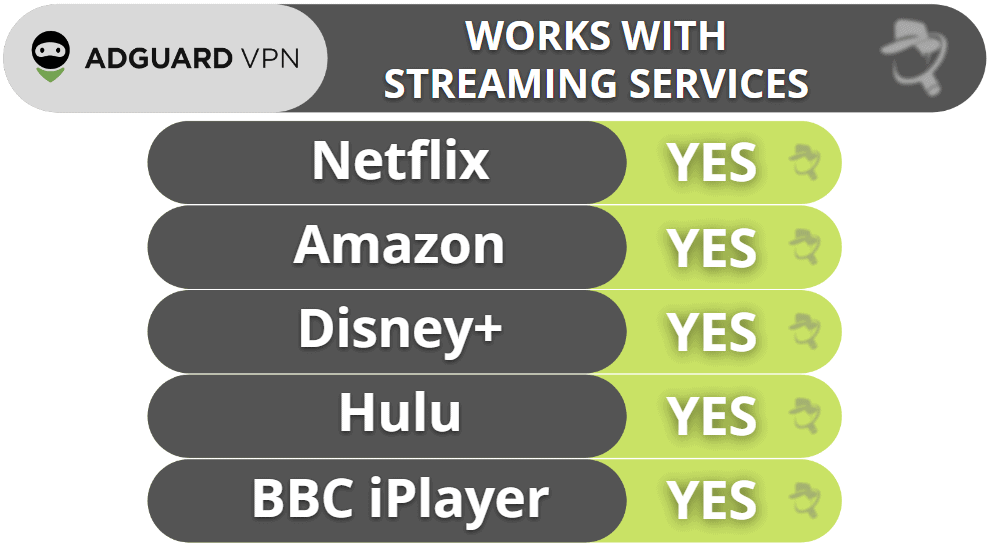
I wasn’t impressed with the VPN’s torrenting support. Customer support informed me that the torrenting traffic is sent to DMCA (Digital Millennium Copyright Act) Free zones. The good news is that the VPN works with popular P2P apps like BitTorrent, uTorrent, and Vuze without any issues.
I like how the VPN also has a SOCKS5 proxy, which changes your IP address but doesn’t encrypt your traffic, so it provides you with faster speeds for downloading files. However, I prefer Private Internet Access a lot more for torrenting because it allows P2P traffic on all servers, offers multiple SOCKS5 proxy servers, and also comes with port forwarding, which connects you to more peers for faster speeds.
Overall, AdGuard VPN is a really good choice for streaming and OK for torrenting. It works with multiple streaming sites and works with popular P2P apps.
AdGuard VPN Ease of Use: Mobile & Desktop Apps — User-Friendly & Customizable
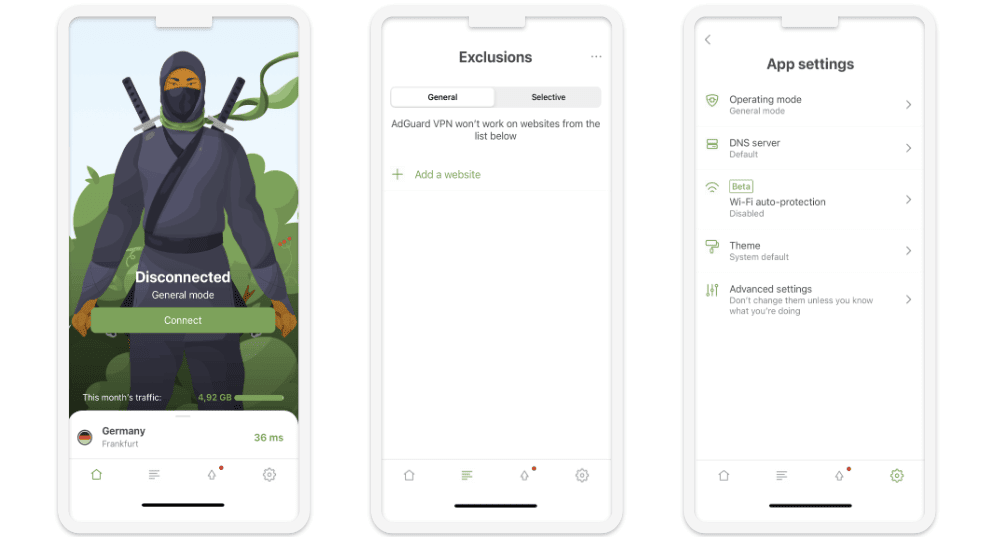
AdGuard VPN has user-friendly apps for iOS, Android, Windows, and macOS. It also has browser extensions for Chrome, Firefox, Edge, and Opera. That being said, I prefer VPNs that offer apps for all of the popular operating systems like Linux, smart TVs, and routers.
I really like the iOS app. It has two modes — when the app is in General mode, it uses the AdGuard VPN protocol. In Integrated mode, it uses the IPSec protocol that allows the VPN and the AdGuard ad blocker to work together. What’s more, you can easily connect or disconnect to a server or choose a new server location by holding the app icon. However, the iOS app doesn’t come with a kill switch.
The Operating Mode section lets you choose one of 3 options — VPN, Proxy, and Compatibility Mode. In VPN mode, all traffic is routed through the VPN automatically. When Proxy mode (SOCKS5) is enabled, AdGuard VPN runs a local proxy server that other applications can use to route their traffic. When using Compatibility Mode, both AdGuard VPN and AdGuard Ad Blocker work together. The Operating mode is available on the Android app and the desktop apps.
The desktop apps are quite user-friendly, too. You can customize the launch settings — for example, you can set the VPN app to open when you log into your PC or set an automatic VPN connection when opening the VPN app. Moreover, you can also change the theme to Light, System, or Dark.
Overall, AdGuard VPN has user-friendly apps for most major devices. They have an intuitive design and offer different modes and customization of launch settings.
AdGuard VPN Customer Support — A Decent Range of Helpful Channels
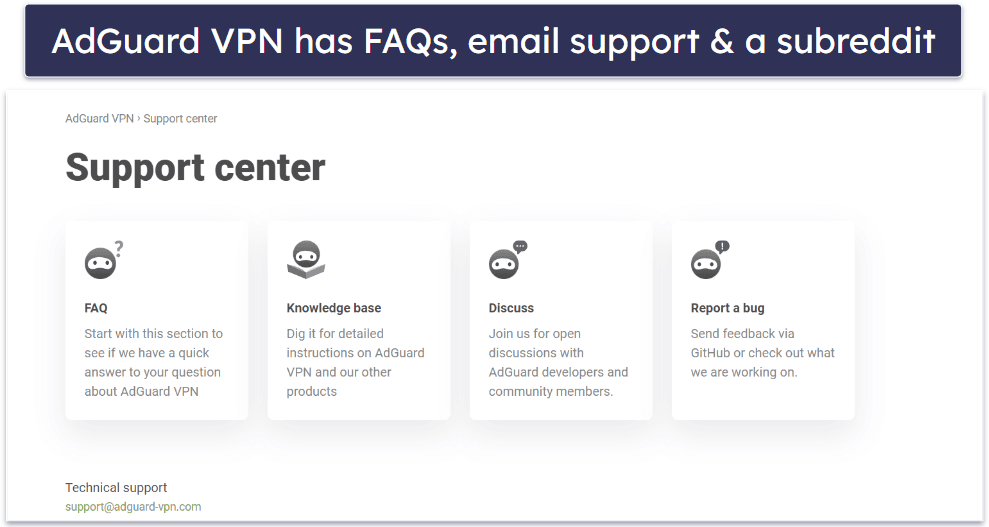
AdGuard VPN offers several channels for customer support. It has email support, a knowledge base, FAQs, a subreddit, GitHub, and a Telegram channel, but there’s no live chat.
I tested the VPN’s email support at different time periods. It took 3 days to receive a response. However, the responses I got were very detailed. and I didn’t have to send a follow-up email. In comparison, ExpressVPN’s email response time is 8 hours.
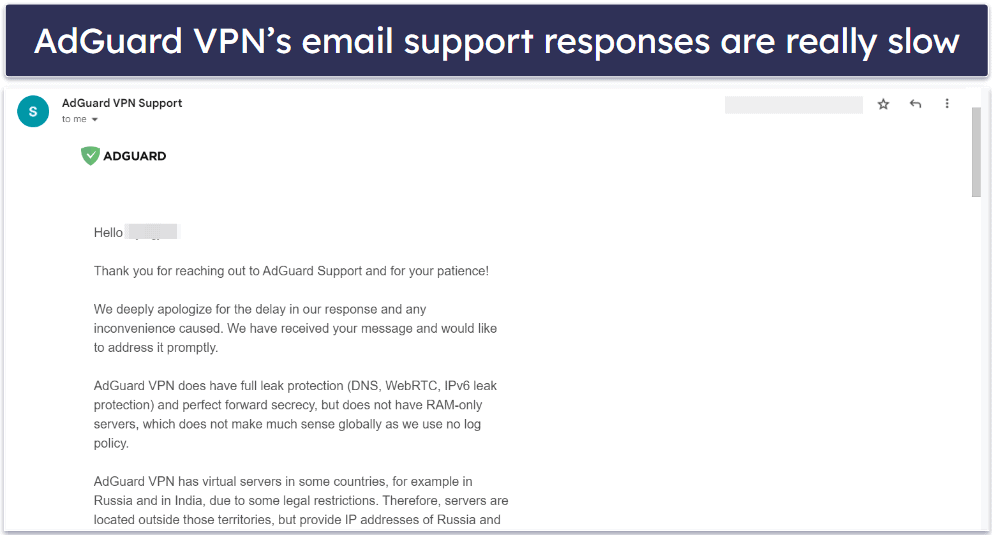
The provider offers support through a knowledge base that has useful setup tutorials. The FAQs section has detailed answers, but you’ll need to select several categories, like the type of device you use and the kind of issue you have, before getting an answer.
It also has a forum, but it’s mostly focused on AdGuard’s ad blocker. Moreover, the VPN gives you the option to report issues on GitHub, you can follow threads on a subreddit, and a Telegram channel.
Overall, AdGuard VPN has decent customer support — a detailed knowledge base, FAQs, a subreddit, a Telegram channel, and GitHub support. However, it lacks a 24/7 live chat, and its email support can be slow.
Is AdGuard VPN Worth It?
AdGuard VPN is a pretty good VPN but it doesn’t match the best VPNs on the market. It has fast speeds on nearby servers, great streaming support, and user-friendly apps. Moreover, it comes with extra features, like split-tunneling and AdGuard DNS.
However, it lacks some advanced security features, like RAM-only servers, and its no-logs policy hasn’t been independently audited. It has a small server network of 1,000+ servers in 60 countries and is missing a 24/7 live chat. Plus, its email support can take up to 3 days to respond.
AdGuard VPN offers several long-term plans and a free trial. The free plan allows 3 GB of data per month, access to 10 server locations, and 2 simultaneous connections. The paid plans allow up to 10 connected devices and only the 1-year, and other long-term plans have a 30-day money-back guarantee.
Frequently Asked Questions
Is AdGuard VPN safe?
Yes, AdGuard VPN has strong security features, like 256-bit AES encryption, full leak protection, a strict no-logs policy, and a kill switch that disables your internet connection if your VPN connection drops to prevent data leaks.
However, the VPN lacks some advanced security features, such as RAM-only servers, and its no-logs policy hasn’t undergone an independent audit.
Does AdGuard VPN work with Netflix?
Yes, in my tests, AdGuard VPN reliably worked with Netflix. You can also watch content on other streaming services, like Disney+, BBC iPlayer, Hulu, Amazon Prime, and more when connected to the VPN.
Is AdGuard VPN free?
Yes, AdGuard VPN has a free plan, but it’s not very good. It restricts you to 10 server locations, 3 GB of monthly data, and 2 simultaneous connections. If you’re only looking for a free plan, I recommend checking out our top picks in 2025. Frankly, purchasing a plan is a better option, as it gives you access to 1,000+ servers in 60 countries, unlimited data, and 10 connected devices.
Does AdGuard VPN allow torrenting?
Yes, AdGuard VPN allows torrenting, but it sends P2P traffic through DMCA Free zones. What’s more, it works with popular P2P apps and has SOCKS5 proxy support. That said, there are much better options for torrenting out there.

